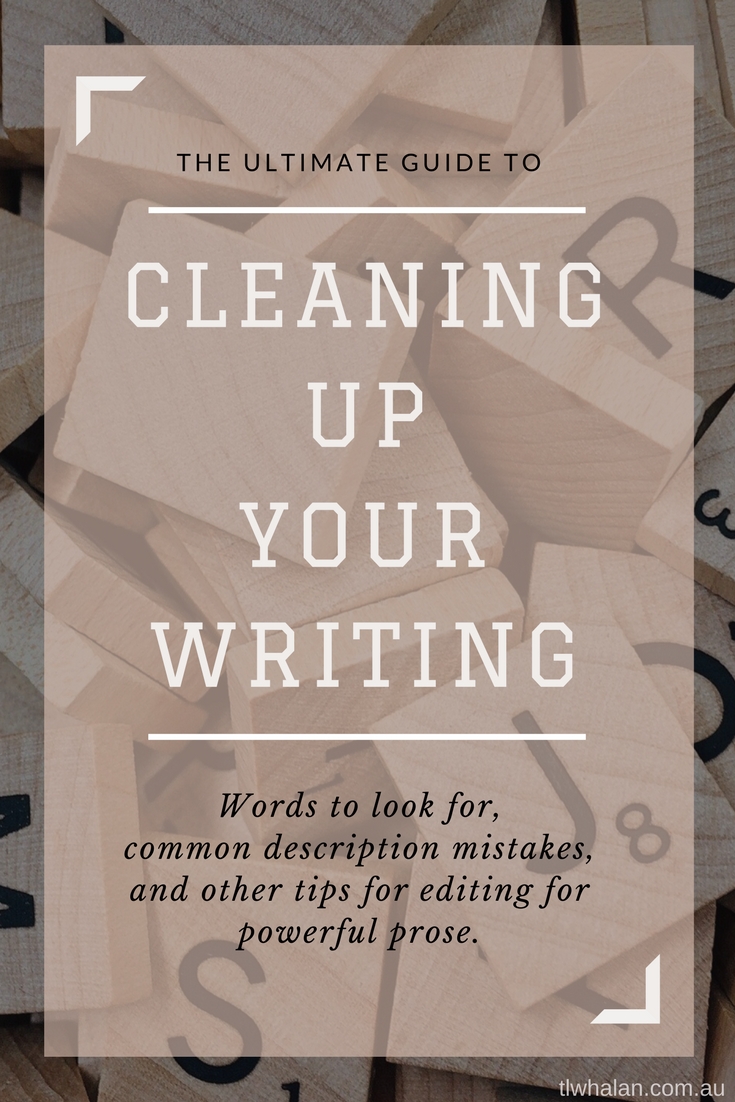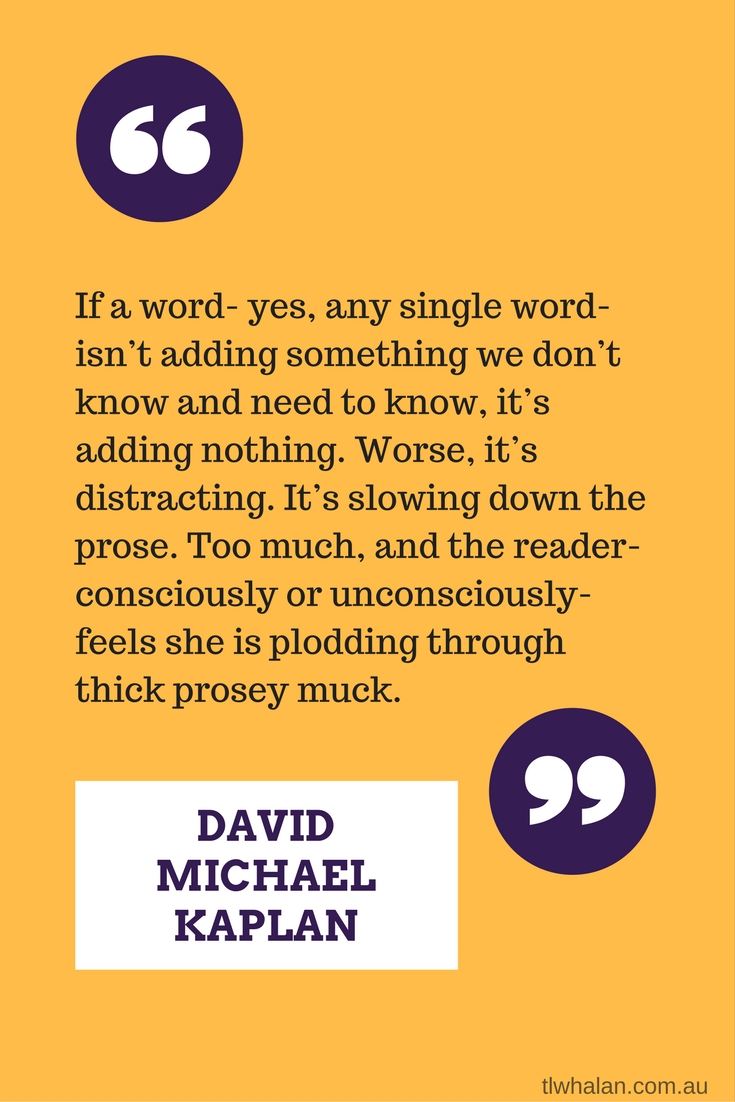
Completed your first draft? Awesome.
Edited your draft for plot, character, setting? Sweet.
Looked at grammar and spelling? Nice.
Now, the only thing left to do is actually think about your writing.
You want to make sure that everything else is done before you get to this point. You don’t want to spend time editing scenes you’re going to cut.
Once you’ve got this sorted, here’s what I suggest you do next:
Search the Document for These Words
Below is a list of ‘problem words’, but the problems they indicate are broad. What I suggest you do is pull out your manuscript, go to edit > find, and search for each of them. Then, look at every single result, and work out a way you can make that word disappear from your manuscript because, in all likelihood, its presence is damaging your writing.
- very – You can probably delete this word and it will not make any difference to your manuscript.
- really – As above.
- quite – As above.
- just – As above.
- only – As above.
- even – As above.
- ly (words ending with) – This suggests you’re using an adverb. Adverbs are ugly, and suggest you should pick a stronger verb. i.e. Instead of saying sadly walked, they shuffled.
- ing (words ending with) – These words sound clunky and are often passive. Try to change the sentence so that ‘ing isn’t needed. i.e. Instead of saying ‘Sally smiled while fixing her hair’, say ‘Sally smiled and fixed her hair’.
- “ – There are so many things you could do wrong with dialogue. This is simply a reminder to read up on dialogue and make sure you’re doing it right.
- thing – Vague word. You can do better.
- stuff – As above.
- felt (feel) – Often used as a filter word. i.e. Instead of saying ‘Jonathon felt the pearls against his fingers’ would be better as ‘Jonathon ran his fingers over the pearls’.
- heard (hear) – As above.
- smelt (smell) – As above.
- saw (see) – As above.
- tasted (taste) – As above.
- thought (think) – As above.
- wondered (wonder) – As above.
- realised (realise) – As above
- seemed (seems) – As above.
- appeared (appears) – As above.
- was – This has the tendency to suck the reader out of the action. Instead of ‘Bruce was happy’, how about, ‘Bruce smiled’.
- is – As above.
- am – As above
- start – This is often used as in ‘Paula started to walk to her front door’ – but it’s better to say, ‘Paula walked to her front door’.
- began / begin – As above
- of the – Extra words you don’t need. ‘All of the cats were black’ could easily be ‘The cats were all black’.
- that
- some – Vague. Includes use as somehow, somewhat, and somewhere.
- then – Your story is probably told in a chronological-enough order that ‘then’ is implied.
- now – As above.
- there – Often an empty opening. ‘There is pineapple on the pizza’ could be ‘The pizza has pineapple’.
- here – Often an empty ending, like above.
- almost – Vague word that probably doesn’t influence story. ‘John almost reached the top shelf’ is pretty blah compared to ‘John’s fingertips could only graze the top shelf’.
- perhaps – As above.
- maybe – As above.
- a little – As above.
- many – As above.
- about – As above.
- already – As above.
- close to – As above.
- kind of – As above.
- sort of – As above.
- as – This is often used when someone couldn’t be doing both things. e.g. Frank took a sip of his wine as he ran his hand through his hair.
- while – As above.
- to him / to her / to me – Often the ‘to me’ is unnecessary. If it’s a first person narration, ‘to me’ is very not necessary, as everything in the text is in their point of view.
- to himself / to herself / to myself – As above.
Phew! That probably took you about a decade, right? But there’s more than just the find-and-fix method. Now we move onto tricker things…
Use precise language
Instead of saying tree, say birch. Instead of saying ‘something round’ (you would’ve found that when replacing the words above – both some and thing!), replace with globe.
But don’t over describe…

But at the same time – not too much! Ask yourself if the reader really needs to know that. What difference will it mean to your story if you leave out that description? I commonly see this when a writer specifies a left or right body part. What difference does it make to the story if it’s the left or right hand our protagonist is using? Probably it doesn’t. So you should cut it.
Give your reader credit
Don’t tell them the sun is warm – isn’t it normally? Don’t say that “they loaded their clothes into the white washing machine” when “they loaded the washing machine” is suffice. Here are some examples from David Michael Kaplan’s Revising Your Prose for Power and Punch (there are many more!):
A small frown appeared on her face. (Where else do frowns appear?)
He squinted his eyes. (With what else do you squint?)
She shrugged her shoulders. (With what else do you shrug?)
The child nodded her head. (With what else do you nod?)
After he pulled up the chair, he sat down on the seat. (Where else?)
He held the bird in his hand. (Unless he’s holding it with something like fire tongs, he’s probably using his hand.)
An unknown stranger appeared at the door. (Are there any known strangers?)
Use would or had once per event
There is a temptation when writing a flashback, to describe what had or would happen. Often you use ‘had’ or ‘would’ several times over. For example;
In the past Franklin would make sure he went to bed with his teddy bear. He would pull it off the shelf and squeeze it to his chest. Laying in bed, he would pull the covers right up to his chin and the teddy’s. Of a morning, he would place the teddy back on the shelf and would pat its head.
The ‘would’ is repetitive and, though perhaps correct, is messy and unappealing. Instead, how’s:
In the past Franklin would make sure he went to bed with his teddy bear. Franklin pulled it off the shelf and squeezed it to his chest. Laying in bed, he pulled the cover right up to his chin and the teddy’s. Of a morning, he placed the teddy on the shelf and patted its head.
This takes us into the zone, into the place, why would is a jarring reminder that we are seeing a flashback
Look for repetition
You might be using the same word or phrase over and over. Reading aloud is a good way to find and eliminate these. Also look for repetition of concept – if you’ve described her face going red and her voice rising, we don’t need to be told that she’s angry. (As a side note: Repetition is sometimes used as a poetic device and, if that’s what you’re wanting, go right ahead.)
Make sure every sentence is as powerful as it could be
This seems like a huge amount of work, but you want your story to be awesome, right? So look at every sentence and work out if it’s written the best it can, with the ‘punch’ coming at the end of the sentence.
Conclusion
Now this seems like a lot of work – and it is. But as you have more practice, you’ll see these more easily. You’ll also get to know your own tendencies and vices and be able to focus on matters that you know are problematic to you. Happy editing!
I couldn’t have written this blog without the great resources linked below:
18 Writing Hacks for Stronger Prose
Revising Your Prose for Power and Punch
Tips to Avoid ‘Telling’ Writing in Personal Narratives and Fiction
43 Words You Should Cut From Your Writing (including Word find-replace tip!)